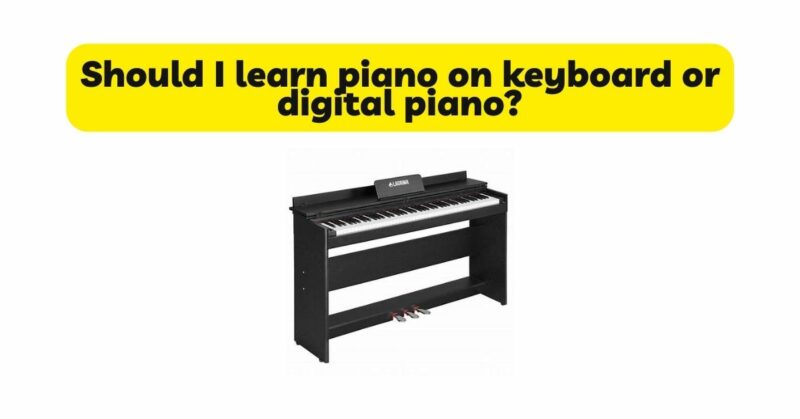Learning to play the piano is a wonderful journey that requires careful consideration when choosing the right instrument. Aspiring pianists often find themselves faced with the decision of whether to learn on a keyboard or a digital piano. In this article, we will explore the factors to consider when deciding between these two options. By examining the advantages and considerations of learning piano on a keyboard or digital piano, you will be able to make an informed decision that aligns with your musical goals and preferences.
- Authenticity and Realism: One of the key considerations when choosing an instrument is the authenticity and realism it offers. Digital pianos are specifically designed to replicate the sound and feel of an acoustic piano. They often utilize sophisticated sampling technology to capture the nuances of an acoustic piano’s sound and employ weighted keys or graded hammer action to mimic the touch and response of acoustic piano keys. This authenticity provides a realistic piano-playing experience, making digital pianos an excellent choice for those seeking a genuine piano feel.
- Touch Sensitivity and Key Action: Touch sensitivity and key action play a significant role in developing proper piano technique and expressive playing. Digital pianos are known for their touch-sensitive keys, which respond to the player’s touch and allow for nuanced expression. Some digital pianos also offer graded hammer action, meaning that the lower keys have a heavier touch similar to an acoustic piano, while the higher keys have a lighter touch. This feature enables learners to develop proper finger strength and control. In contrast, keyboards may have lighter or unweighted keys, which may not offer the same level of touch sensitivity and key action as digital pianos.
- Sound Quality and Reproduction: Sound quality is a crucial consideration when learning the piano. Digital pianos excel in reproducing the sound of an acoustic piano. Through advanced sampling technology, they can capture the distinct tonal characteristics of acoustic pianos, including the rich harmonics and resonance. Digital pianos also often feature additional sound options, including various piano tones and other instrument sounds, providing versatility for exploring different musical styles. Keyboards, on the other hand, may offer a range of sounds, but they may not fully replicate the authentic sound of an acoustic piano.
- Durability and Maintenance: Durability and maintenance requirements are important considerations, especially for long-term investments. Digital pianos are designed to be robust and durable, built to withstand regular use. They generally require minimal maintenance beyond occasional cleaning and software updates. On the other hand, keyboards may have a less sturdy construction and may require more frequent maintenance or repairs. While keyboards are often more affordable, they may not have the same longevity and durability as digital pianos.
- Additional Features and Connectivity: Digital pianos often come equipped with a range of additional features that enhance the learning experience. These features may include built-in metronomes, recording capabilities, lesson modes, and connectivity options to computers, tablets, or mobile devices. Such connectivity allows for integration with music software, educational apps, and online learning resources. Keyboards may also offer some of these features, but digital pianos typically provide more advanced functionalities tailored specifically for piano learning and performance.
- Portability and Space Considerations: Portability and space requirements are practical considerations when choosing an instrument. Keyboards are generally compact and lightweight, making them easy to transport and store. They are an ideal choice for individuals with limited space or those who need an instrument that can be easily moved. Digital pianos, while heavier and bulkier than keyboards, are still more portable compared to acoustic pianos. However, it is important to note that digital pianos may take up more space and require a dedicated area for setup, unlike keyboards that can be easily stored away.
- Personal Preferences and Goals: Ultimately, the choice between a keyboard or a digital piano should align with your personal preferences and goals. Consider the style of music you want to play, your commitment level, and your aspirations as a pianist. If you prioritize an authentic piano experience and want to develop advanced piano technique, a digital piano may be the better choice. If versatility, portability, and affordability are your primary concerns, a keyboard may be a suitable option.
Conclusion: Choosing between learning piano on a keyboard or a digital piano requires careful consideration of various factors, including authenticity, touch sensitivity, sound quality, durability, additional features, portability, and personal preferences. Digital pianos offer an authentic piano-playing experience, realistic touch sensitivity, and high-quality sound reproduction. They often provide additional features and connectivity options that enhance the learning experience. Keyboards, while offering affordability and portability, may have limitations in touch sensitivity, sound quality, and authenticity. Ultimately, the decision should be based on your musical goals, budget, available space, and desired piano-playing experience. By considering these factors, you can make an informed choice and embark on your piano learning journey with an instrument that best suits your needs and preferences.


